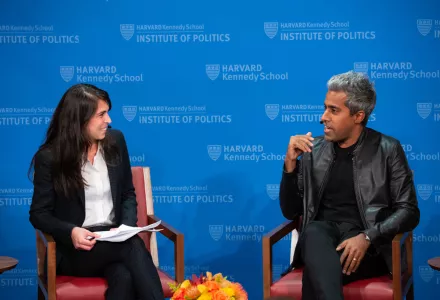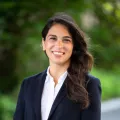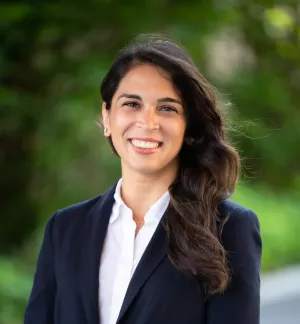
Aditi Kumar is Executive Director of the Belfer Center. Prior to joining the Center, she was a Principal at Oliver Wyman in the financial services and public policy practices, and earlier was a project manager at the World Economic Forum. A joint graduate of Harvard Kennedy School and Harvard Business School, she also worked previously in the International Affairs office of the U.S. Department of the Treasury.
You joined the Belfer Center as Executive Director a year ago this month. As you look back over the past 12 months, what are some aspects of your work and involvement with the Center that stand out most?
It’s a very creative challenge to help lead the organization through a period of such rapid and significant change. We are in a political environment where the usual lines of communication to policymakers are weaker, so we have emphasized more field work, track II dialogues, participation in multilateral forums, and other ways to drive impact. The way people consume news and policy analysis, through social media, video, and short-form formats has pushed us to rethink the way we engage our stakeholders. And, we continue to evolve our research portfolio, and build out an expert and diverse team of faculty, fellows, staff, and students to address the most pressing policy challenges. It has been exciting for me to help shape the Center in these ways.
Along with your Center management hat, you have launched a new research focus called the Economic Diplomacy Initiative or EDI. Why is economic diplomacy especially important at this time?
The idea of economic policy as an instrument for achieving national strategic objectives is obviously not a new one. What is new, and evolving, is the number of nations with the capacity to wield economic power, and the interconnectedness and complexity of global economies that enable a more diverse and impactful set of economic tools. China, which barely had a GDP of $1 trillion twenty years ago, today envisions investing $1 trillion in its Belt and Road Initiative. The technological sophistication of the global financial system now allows the United States to surgically target specific Russian oligarchs in response to the invasion of Crimea, rather than enforce blunt sanctions impacting the average Russian citizen. In the context of more state actors wielding economic power in meaningful ways, the Initiative explores the impact of policy tools like investment and sanctions, competing visions of the future of the global economy, and the industries and economic infrastructure critical to national security.
One of the major efforts of the Economic Diplomacy Initiative so far is the digital currency simulation event you organized. What was the goal for this simulation?
The simulation illustrated the centrality of economic power to national security. Today, the United States has so much leverage in the way it can shape foreign affairs, because we have the deepest capital markets, the most efficient market infrastructure, and the global reserve currency. We wanted to illustrate how these advantages could erode—in a matter of months, not decades—and what policy choices we need to be considering today to avoid this scenario.
Watch the simulation at belfercenter.org/DCW
Looking ahead, what are you excited about with regard to the Center’s current and future impact?
For me, the most exciting part of all this is the students. The EDI simulation was entirely student-led, as is much of our work in the Defending Digital Democracy Project, the Korea Project, and many other initiatives. I was an MPP student here, so I know how much having a base for research and mentorship, and just the encouragement of faculty and staff to engage, can change the academic experience. It’s rewarding to then see these students move on to impactful roles in the public and private sectors. Hopefully we’ll be their first call when they face policy and management challenges in their careers.
"Q&A: Aditi Kumar." Belfer Center Newsletter, Belfer Center for Science and International Affairs, Harvard Kennedy School. (Fall/Winter 2019-2020).



